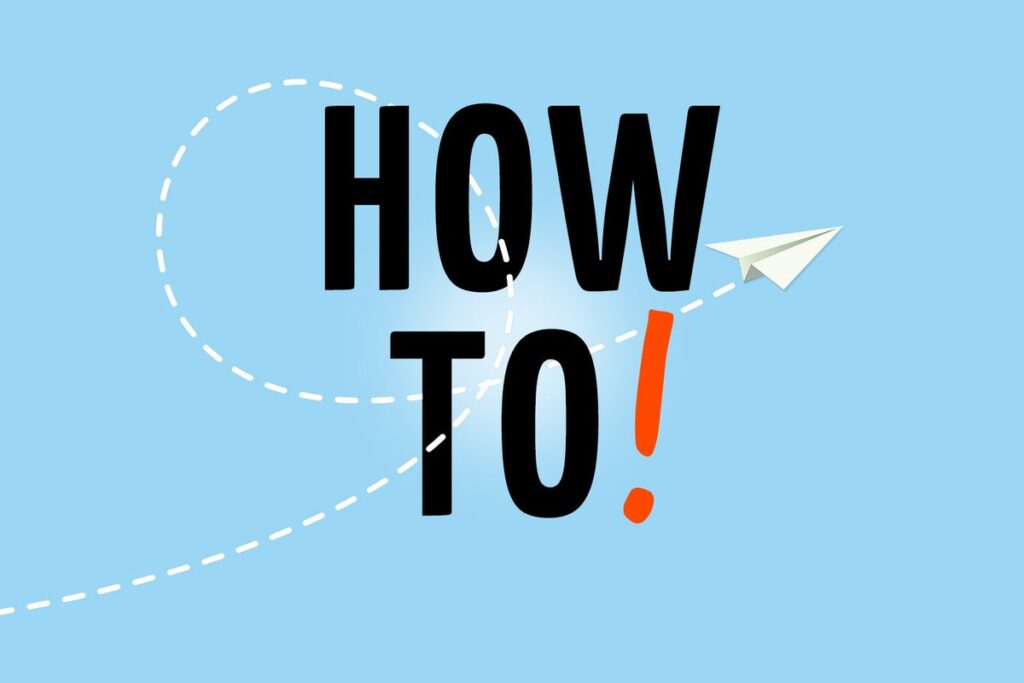Hello there friend! Are you looking to learn something new? Well, have I got a treat for you! Today, we’ll be talking about a very interesting topic – “how to”. I can’t wait to share all the exciting details with you, so let’s dive right in!
Now, I know you’re probably curious about what exactly we’ll be covering in this article. Trust me, you won’t be disappointed! We’ll be discussing all sorts of “how to” tips and tricks that will make your life easier and more enjoyable. Whether you want to learn how to cook a delicious meal, organize your space, or even master a new skill, we’ve got you covered. So get ready to expand your knowledge and discover some fantastic “how to” insights. Stay tuned for more!
How to Learn and Master New Skills
Introduction
The importance of knowing how to do things
In today’s fast-paced world, knowing how to do various skills is more important than ever. Whether it’s learning how to cook a delicious meal, play a musical instrument, or code a website, having a diverse range of skills can greatly enhance your personal and professional life. Knowing how to do things not only makes you more self-sufficient but also opens up new doors for creativity, problem-solving, and personal growth.
Why learning how to is crucial
Learning how to do things is crucial because it empowers you to take control of your life. It allows you to become more independent and self-reliant, reducing your reliance on others for everyday tasks. Additionally, learning new skills broadens your horizons and provides a sense of fulfillment and accomplishment. It boosts your confidence and self-esteem, as you gain the ability to tackle new challenges and overcome obstacles. Moreover, nothing beats the satisfaction of successfully learning and mastering a new skill.
Getting Started
Identifying what you want to learn
The first step in learning a new skill is identifying what exactly you want to learn. Reflect on your interests, passions, and goals to determine the skills that align with them. For example, if you enjoy painting, you might want to learn different painting techniques or explore different mediums. It’s important to choose a skill that excites you and that you have a genuine interest in, as this will make the learning process more enjoyable and rewarding.
Setting goals and objectives
Once you have identified the skill you want to learn, it’s crucial to set clear goals and objectives. Without clear goals, it’s easy to lose motivation and direction. Start by setting long-term goals, such as becoming an expert in the skill or achieving a certain level of proficiency. Then, break down these goals into smaller, achievable objectives. This allows you to track your progress and celebrate small victories along the way.

Finding Resources
Researching online resources
The internet is a treasure trove of resources for learning new skills. Conduct thorough research to find credible and reliable online resources that align with your learning needs. Look for websites, blogs, and online courses that offer step-by-step instructions, tutorials, and practice exercises. Take advantage of free resources, such as video tutorials and articles, but also consider investing in paid courses or subscriptions for a more comprehensive learning experience.
Joining online communities and forums for tips and advice
In addition to online resources, joining online communities and forums can greatly enhance your learning journey. These platforms provide opportunities to connect with like-minded individuals who share the same passions and interests. Engage in discussions, ask questions, and seek advice from more experienced learners or experts in the field. The knowledge and insights gained from these communities can often be invaluable in overcoming challenges and improving your skills.
Learning Methods
Reading books and articles
Books and articles are traditional yet effective learning methods that should not be underestimated. Look for books and articles written by experts in the field, as they often provide in-depth knowledge and valuable tips. Reading allows you to delve into the theory and fundamentals of a skill, deepening your understanding and providing a strong foundation for practical application. Make it a habit to read regularly and take notes to consolidate your learning.
Watching instructional videos
In this digital age, instructional videos have become a popular and accessible way to learn new skills. Platforms like YouTube offer a vast array of video tutorials for everything from photography to woodworking. Watching instructional videos gives you a visual demonstration of the skill, making it easier to understand and replicate. To make the most out of instructional videos, take notes and practice alongside the video, pausing and rewinding as needed.

Practical Application
Hands-on practice
Learning a new skill is not solely about acquiring knowledge; it’s about putting that knowledge into practice. Hands-on practice is crucial for developing muscle memory, improving technique, and gaining practical experience. Allocate dedicated time for practice, starting with simple exercises and gradually progressing to more complex tasks. Embrace the process of trial and error, as making mistakes is an essential part of the learning journey. Practice consistently, and with time, you’ll notice significant improvements.
Finding opportunities to apply what you’ve learned
To truly master a skill, it’s important to find opportunities to apply what you’ve learned in real-life situations. Look for projects, collaborations, or volunteer work where you can showcase your skills. Applying what you’ve learned in practical scenarios not only reinforces your knowledge but also exposes you to new challenges and learning opportunities. Embrace every opportunity to refine your skills and gain valuable experience.
Seeking Guidance
Finding mentors or experts in the field
Learning from someone who has already mastered the skill you’re learning can greatly accelerate your progress. Look for mentors or experts in the field who are willing to share their knowledge and provide guidance. They can offer personalized advice, answer specific questions, and provide valuable insights. Engage in mentorship programs, workshops, or seek out professionals in your community. Their expertise and experience can help you overcome challenges and refine your skills more quickly.
Asking for feedback and advice
In addition to mentors, seeking feedback and advice from peers and those more experienced than you can also be incredibly beneficial. Share your work and seek constructive criticism to identify areas for improvement. Actively seek feedback and be open to suggestions for growth. Feedback helps you identify blind spots, correct mistakes, and continually refine your skills. By actively seeking feedback, you can accelerate your progress and continually strive for excellence.
Overcoming Challenges
Dealing with frustration and setbacks
Learning new skills is not always smooth sailing. It’s common to face frustration and setbacks along the way. When faced with challenges, it’s important to stay resilient and positive. Embrace the mindset that setbacks are opportunities for growth and learning. Break down complex tasks into smaller, manageable steps, and celebrate small victories to stay motivated. Remember that learning is a journey, and perseverance is key to overcoming challenges and achieving success.
Developing a growth mindset
Having a growth mindset is crucial for long-term learning and skill development. Embrace the belief that your abilities and intelligence can be developed through dedication and hard work, rather than being fixed traits. Embrace challenges, learn from criticism, and find inspiration in the success of others. Cultivating a growth mindset allows you to approach learning with an open mind and constantly seek improvement, ultimately leading to greater success and fulfillment.
Tracking Progress
Setting milestones and measuring your progress
Tracking your progress is essential for staying motivated and maintaining focus. Set milestones or checkpoints along your learning journey to evaluate your progress. These milestones could be mastering a specific technique, completing a project, or achieving a certain level of proficiency. Celebrate these milestones as markers of your growth and progress. Tracking your progress not only helps you stay motivated but also provides a sense of accomplishment and satisfaction.
Keeping a record of your achievements
To further motivate yourself and keep track of your progress, consider keeping a record of your achievements. Maintain a learning journal or create a digital portfolio to showcase your work and the skills you have acquired. Reflecting on your achievements allows you to appreciate how far you have come and serves as a reminder of your capabilities. It can also be a valuable tool when seeking new opportunities or when sharing your skills with others.

Sharing and Teaching
Sharing your knowledge with others
One of the most rewarding aspects of learning new skills is being able to share your knowledge with others. Share what you have learned with friends, family, or your community through informal conversations, demonstrations, or workshops. Teaching others not only reinforces your own understanding of the skill but also gives you a sense of purpose and fulfillment. Sharing your knowledge can inspire others to embark on their own learning journeys and create a positive ripple effect.
Teaching others how to do what you’ve learned
Teaching others what you have learned is a powerful way to solidify your skills and become a true master. Actively seek opportunities to teach others, whether through mentorship programs, online tutorials, or workshops. Teaching others forces you to break down complex concepts into simple terms, reinforcing your own understanding. It also allows you to refine your communication and leadership skills. By teaching others, you become an inspiration and contribute to the growth of the learning community.
Conclusion
The satisfaction of learning and achieving new skills
Learning and mastering new skills is a fulfilling and rewarding journey. It empowers you to become more self-sufficient, creative, and adaptable. The satisfaction of acquiring new skills and seeing your progress firsthand is unmatched. Each new skill learned opens up a world of possibilities, enhances your personal and professional life, and expands your horizons.
Continuing the learning journey
Learning new skills is not a one-time task; it’s a lifelong journey. Embrace a growth mindset, stay curious, and remain open to new opportunities for learning. Make it a habit to continuously seek new skills and refine existing ones. Engage in lifelong learning, as it keeps your mind sharp, cultivates personal growth, and ensures you never stop evolving. Remember, the journey of learning is just as important as the skills you acquire along the way. So, embark on this journey today and unlock your full potential.




